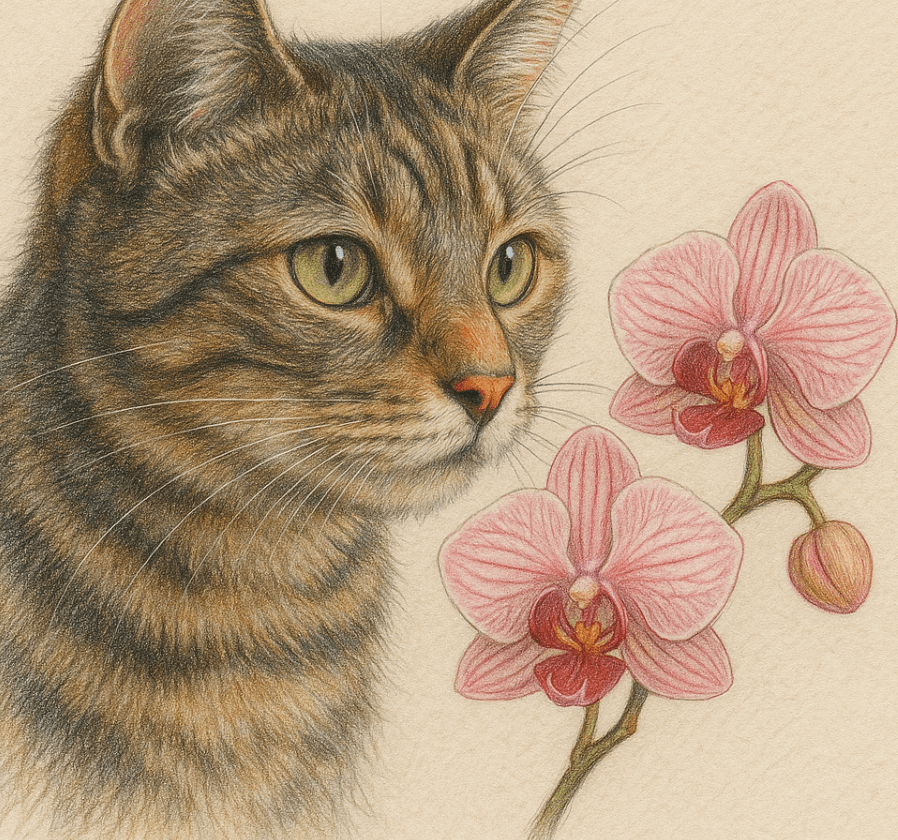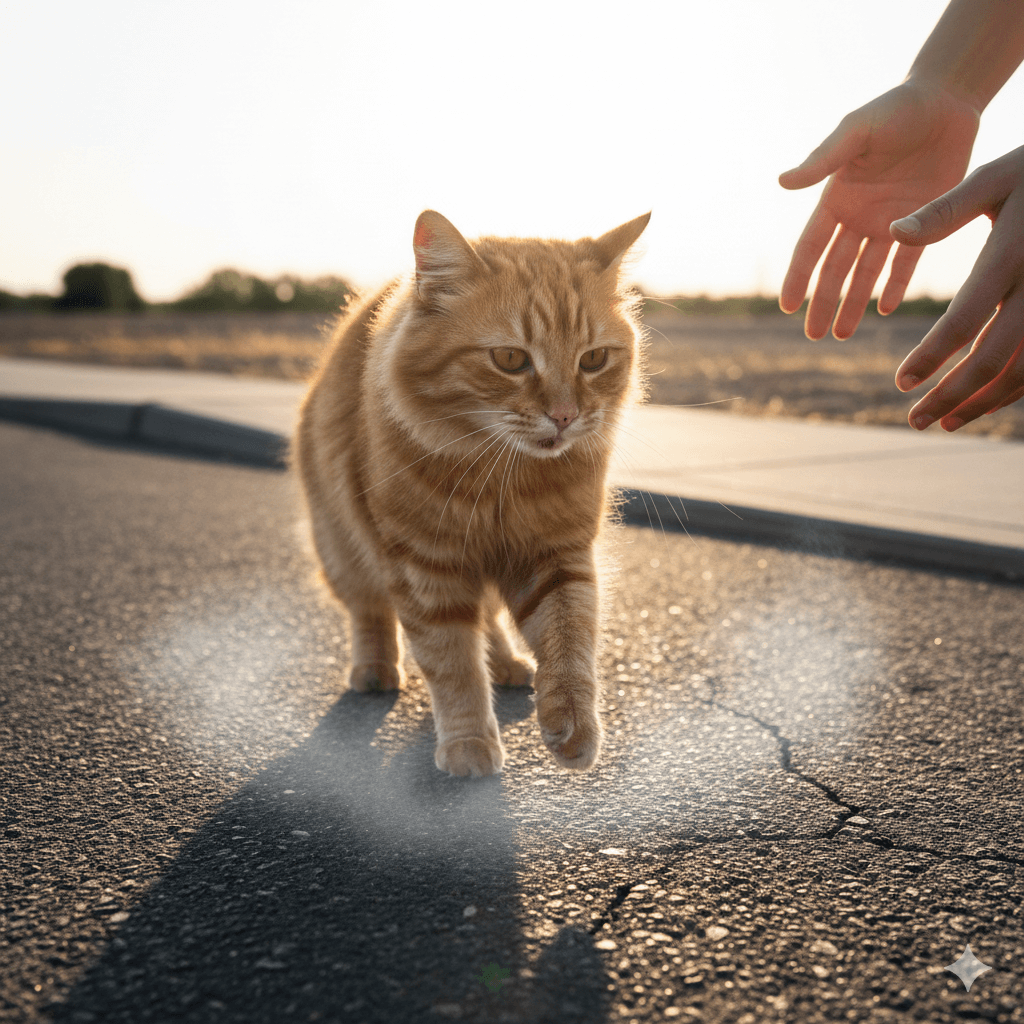Can Cats Eat Orchids?
Orchids are one of the most popular houseplants, admired for their beauty and elegance. However, if you’re a cat owner, you might wonder whether these stunning flowers pose any risks to your curious feline friend. Cats are notorious for nibbling on plants, and while some plants are safe, others can be toxic or harmful. So, can cats eat orchids? The good news is that most orchids are non-toxic to cats, but there are still important considerations to keep in mind to ensure your pet’s safety. In this blog post, we’ll explore everything you need to know about cats and orchids, from potential risks to tips for keeping both your plants and your cat happy.
Are Orchids Safe for Cats?
While orchids are generally considered non-toxic to cats, it’s essential to understand what makes them safe and how they might still affect your pet. Here’s what you need to know about orchids and their compatibility with cats.
Non-Toxic Classification:
According to the ASPCA, common orchid varieties like Phalaenopsis, Dendrobium, and Cattleya are not toxic to cats, meaning they won’t cause severe poisoning if ingested.Mild Digestive Upset:
Even though orchids aren’t toxic, eating plant material can still upset your cat’s stomach, leading to symptoms like vomiting or diarrhea.Choking Hazards:
Small parts of the orchid, such as petals or leaves, could pose a choking risk if your cat chews excessively.Pesticide Concerns:
If your orchid has been treated with chemical fertilizers or pesticides, these substances could harm your cat if ingested.Curiosity Can Lead to Trouble:
Cats are naturally curious, and their tendency to nibble on plants can sometimes lead to unexpected issues, even with non-toxic species.
While orchids are generally safe, it’s important to monitor your cat’s interactions with them to avoid unnecessary risks.
Signs Your Cat May Have Eaten Orchids
If your cat decides to snack on your orchids, you may notice subtle signs that indicate they’ve been chewing on the plant. Here’s what to look out for and how to respond.
Vomiting:
Ingesting plant material can irritate your cat’s stomach, leading to occasional vomiting.Diarrhea:
Digestive upset from eating orchids may result in loose stools or changes in bathroom habits.Excessive Drooling:
Chewing on leaves or petals can cause mild irritation in your cat’s mouth, leading to increased drooling.Lethargy:
If your cat seems unusually tired or uninterested in play, it could be a sign of mild discomfort from eating orchids.Behavioral Changes:
Cats who feel unwell may hide more often or show reduced interest in food or water.
If you notice any of these symptoms, monitor your cat closely and consult your veterinarian if the issue persists.
Check this guide 👉Can Cats Eat Deer Meat? Best 7 Expert Tips!
Check this guide 👉Can Cats Eat Kiwis? Best 7 Expert Tips!
Check this guide 👉Can Cats Eat Blue Cheese? Best 7 Expert Tips!

Safe Practices Around Orchids | Risks to Watch For |
|---|---|
Keep orchids out of easy reach | Potential digestive upset from ingestion |
Use organic, pet-safe fertilizers | Chemical exposure from treated plants |
Supervise your cat around plants | Choking hazards from small plant parts |
Place orchids in elevated areas | Overconsumption leading to discomfort |
Train your cat to avoid plants | Behavioral changes indicating illness |
How to Protect Your Orchids (and Your Cat)
Preventing unwanted interactions between your cat and your orchids is key to maintaining harmony in your home. Here are some practical tips to safeguard both your plants and your pet.
Elevate Your Orchids:
Place your orchids on high shelves or hanging planters where your cat can’t easily access them.Use Cat Deterrents:
Apply pet-safe deterrent sprays or place citrus peels near your orchids, as cats dislike the smell.Create a Cat-Friendly Plant Corner:
Offer safe, cat-friendly plants like cat grass or spider plants to redirect your cat’s attention.Supervise Playtime Near Plants:
Keep an eye on your cat when they’re near your orchids to discourage chewing or climbing.Train with Positive Reinforcement:
Reward your cat with treats or praise when they avoid your orchids, reinforcing good behavior.
Taking these steps ensures your orchids stay beautiful while keeping your cat safe and happy.
Alternative Plants That Are Safe for Cats
If you’re concerned about your cat’s curiosity around plants, consider adding pet-safe options to your home. These alternatives allow you to enjoy greenery without worrying about toxicity.
Spider Plants:
Spider plants are non-toxic and can even help purify the air in your home.Boston Ferns:
These lush, trailing plants are safe for cats and add a touch of elegance to any room.Cat Grass:
Specifically designed for cats, cat grass provides a safe outlet for their chewing instincts.African Violets:
With their vibrant blooms, African violets are a pet-safe option that adds color to your space.Bamboo Palm:
This hardy plant is non-toxic and thrives in indoor environments, making it a great choice for cat owners.
Switching to cat-friendly plants ensures peace of mind while enhancing your home’s decor.
Common Mistakes Cat Owners Make with Houseplants
Even well-meaning cat owners can inadvertently put their pets at risk when it comes to houseplants. Avoid these common mistakes to ensure your cat stays safe.
Assuming All Plants Are Safe:
Not all houseplants are non-toxic; research each plant before bringing it into your home.Using Chemical Treatments:
Pesticides and fertilizers can be harmful to cats, even if the plant itself is safe.Leaving Plants Within Reach:
Cats are agile climbers, so even “out-of-reach” plants may not be truly inaccessible.Ignoring Signs of Illness:
Failing to act quickly if your cat shows symptoms after eating a plant can lead to complications.Not Providing Alternatives:
Without safe options, cats are more likely to chew on unsafe plants out of curiosity.
Avoiding these pitfalls helps create a safer environment for your feline companion.
Tips for Training Your Cat to Avoid Plants
Teaching your cat to steer clear of plants takes time and patience, but it’s entirely possible with consistent effort. These tips will guide you through the process.
Use Positive Reinforcement:
Reward your cat with treats or praise when they ignore plants, reinforcing desired behavior.Redirect Their Attention:
Provide toys, scratching posts, or cat trees to keep them entertained and away from plants.Create Physical Barriers:
Use plant stands, cages, or barriers to block access to your orchids and other plants.Incorporate Scents They Dislike:
Citrus, vinegar, or commercial deterrent sprays can discourage cats from approaching plants.Be Consistent:
Consistency is key—reinforce boundaries regularly to prevent your cat from testing limits.
With dedication, training can help protect both your plants and your cat.
Health Benefits of Having Plants Around Cats
While it’s important to ensure plants are safe for cats, having greenery in your home offers numerous benefits for both you and your pet.
Improved Air Quality:
Certain plants, like spider plants and bamboo palms, help filter toxins from the air, benefiting your entire household.Stress Reduction:
Studies show that being around plants can lower stress levels, creating a calming environment for you and your cat.Encouraging Natural Behaviors:
Safe plants like cat grass allow cats to engage in natural behaviors like chewing and exploring.Enhanced Aesthetics:
Adding plants to your home creates a welcoming atmosphere that boosts mood and productivity.Bonding Opportunities:
Tending to plants together (with supervision) can become a shared activity that strengthens your bond with your cat.
By choosing the right plants, you can enjoy these benefits while keeping your cat safe and happy.
Frequently Asked Questions About Cats and Orchids
Are all types of orchids safe for cats?
Most common orchid varieties, like Phalaenopsis and Dendrobium, are non-toxic, but always double-check rare species.
What should I do if my cat eats an orchid?
Monitor your cat for signs of digestive upset and contact your vet if symptoms persist or worsen.
Can orchids cause allergies in cats?
While rare, some cats may develop mild skin or respiratory reactions to certain plants.
How can I stop my cat from chewing on orchids?
Use deterrent sprays, elevate the plant, or provide alternative cat-safe plants to redirect their attention.
Are orchids safer than other houseplants?
Yes, orchids are generally safer than many common houseplants, which can be highly toxic to cats.
Enjoying Orchids Safely with Your Feline Friend
Orchids are a beautiful addition to any home, and the good news is that they’re generally safe for cats. By understanding their non-toxic nature, recognizing potential risks, and taking preventive measures, you can enjoy these elegant flowers without compromising your cat’s well-being. Remember, a little preparation goes a long way in creating a harmonious environment where both your plants and your pet can thrive. With the right balance, you can have the best of both worlds—a home filled with greenery and a happy, healthy cat by your side.
Newfoundland Dog Personality: Best 7 Expert Tips! – Discover the gentle, loyal, and protective nature of this giant breed perfect for families.
Can Hot Pavement Burn Your Cats Paws? Best 7 Expert Tips! – Learn how to protect your cat’s paws from hot surfaces and prevent painful burns this summer.
Can Hot Pavement Burn Your Dogs Paws? Best 7 Expert Tips! – Learn how to protect your dog’s paws from hot surfaces and ensure safe summer walks.
Irish Wolfhound Size: Best 7 Expert Tips! – Discover the ideal height, weight, and care tips for this majestic giant breed. Learn how to manage their impressive stature responsibly.




